

Grammar


Tenses


Present

Present Simple

Present Continuous

Present Perfect

Present Perfect Continuous


Past

Past Simple

Past Continuous

Past Perfect

Past Perfect Continuous


Future

Future Simple

Future Continuous

Future Perfect

Future Perfect Continuous


Parts Of Speech


Nouns

Countable and uncountable nouns

Verbal nouns

Singular and Plural nouns

Proper nouns

Nouns gender

Nouns definition

Concrete nouns

Abstract nouns

Common nouns

Collective nouns

Definition Of Nouns

Animate and Inanimate nouns

Nouns


Verbs

Stative and dynamic verbs

Finite and nonfinite verbs

To be verbs

Transitive and intransitive verbs

Auxiliary verbs

Modal verbs

Regular and irregular verbs

Action verbs

Verbs


Adverbs

Relative adverbs

Interrogative adverbs

Adverbs of time

Adverbs of place

Adverbs of reason

Adverbs of quantity

Adverbs of manner

Adverbs of frequency

Adverbs of affirmation

Adverbs


Adjectives

Quantitative adjective

Proper adjective

Possessive adjective

Numeral adjective

Interrogative adjective

Distributive adjective

Descriptive adjective

Demonstrative adjective


Pronouns

Subject pronoun

Relative pronoun

Reflexive pronoun

Reciprocal pronoun

Possessive pronoun

Personal pronoun

Interrogative pronoun

Indefinite pronoun

Emphatic pronoun

Distributive pronoun

Demonstrative pronoun

Pronouns


Pre Position


Preposition by function

Time preposition

Reason preposition

Possession preposition

Place preposition

Phrases preposition

Origin preposition

Measure preposition

Direction preposition

Contrast preposition

Agent preposition


Preposition by construction

Simple preposition

Phrase preposition

Double preposition

Compound preposition

prepositions


Conjunctions

Subordinating conjunction

Correlative conjunction

Coordinating conjunction

Conjunctive adverbs

conjunctions


Interjections

Express calling interjection

Phrases

Sentences


Grammar Rules

Passive and Active

Preference

Requests and offers

wishes

Be used to

Some and any

Could have done

Describing people

Giving advices

Possession

Comparative and superlative

Giving Reason

Making Suggestions

Apologizing

Forming questions

Since and for

Directions

Obligation

Adverbials

invitation

Articles

Imaginary condition

Zero conditional

First conditional

Second conditional

Third conditional

Reported speech

Demonstratives

Determiners

Direct and Indirect speech


Linguistics

Phonetics

Phonology

Linguistics fields

Syntax

Morphology

Semantics

pragmatics

History

Writing

Grammar

Phonetics and Phonology

Semiotics


Reading Comprehension

Elementary

Intermediate

Advanced


Teaching Methods

Teaching Strategies

Assessment
A clever boy
المؤلف:
L.A Hill
المصدر:
Intermediate anecdotes in American English
الجزء والصفحة:
8-1
13/9/2022
1547
A young boy was playing with a ball in the street. He kicked it too hard, and it broke the window of a house and fell inside. A lady came to the window with the ball and shouted at the young boy, so he ran away, but he still wanted his ball back. A few minutes later he returned and knocked at the door of the house, and when the lady answered it, he said, "My father's going to come and fix your window very soon."
After a few more minutes a man came to the door with tools in his hand, so the lady let the boy take his ball away.
When the man finished fixing the window, he said to the lady, "That will cost you exactly ten dollars."
"But aren't you the father of that young boy?" the woman asked, looking surprised. "No," he answered, equally surprised. "Aren't you his mother?"
A. Answer these questions:
- How did the young boy lose his ball?
- Why did he run away?
- And why did he come back?
- Why did the lady let him take his ball away?
- Who did the lady think the man was who came to fix the window?
- Who did he think the lady was?
B. Which of these sentences are true? Write down the correct ones.
- The young boy broke the window of his own house.
- The young boy broke the window of someone else's house.
- The ball went through the window.
- The ball hit the window and fell into the lady's garden.
- The young boy ran away because he wanted his ball back.
- The young boy ran away because he was afraid of the lady.
- The young boy went to find his father.
- The young boy went to find a man who fixed windows.
- The man who fixed the lady's window was not the boy's father.
- The man who fixed the lady's window was the boy's father.
- The man thought that the lady was the boy's mother.
- The man knew that the lady wasn't the boy's mother.
C. Write the number of the correct sentence under each picture:
1- A young boy took his ball out into the street.
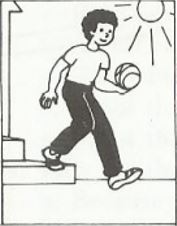
2- He kicked the ball.
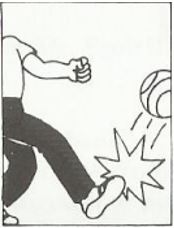
3- He found a man who fixed windows.
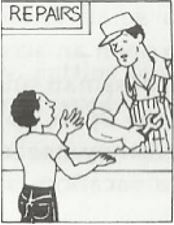
4- He went into another street.
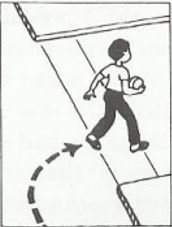
5- It went through the window of a lady's house.

6- The boy ran away.
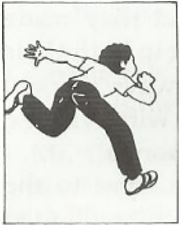
7- The man came and fixed the lady's window.
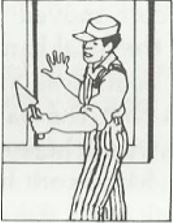
 الاكثر قراءة في Intermediate
الاكثر قراءة في Intermediate
 اخر الاخبار
اخر الاخبار
اخبار العتبة العباسية المقدسة

الآخبار الصحية















 قسم الشؤون الفكرية يصدر كتاباً يوثق تاريخ السدانة في العتبة العباسية المقدسة
قسم الشؤون الفكرية يصدر كتاباً يوثق تاريخ السدانة في العتبة العباسية المقدسة "المهمة".. إصدار قصصي يوثّق القصص الفائزة في مسابقة فتوى الدفاع المقدسة للقصة القصيرة
"المهمة".. إصدار قصصي يوثّق القصص الفائزة في مسابقة فتوى الدفاع المقدسة للقصة القصيرة (نوافذ).. إصدار أدبي يوثق القصص الفائزة في مسابقة الإمام العسكري (عليه السلام)
(نوافذ).. إصدار أدبي يوثق القصص الفائزة في مسابقة الإمام العسكري (عليه السلام)


















